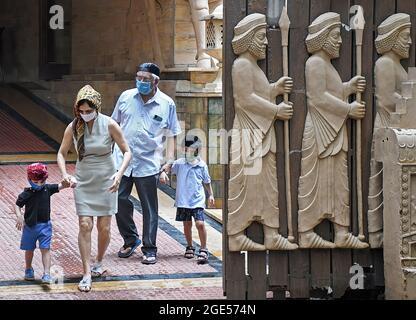
August 16, 2021: New Year for Parsis in India
Parsis are the followers of parsism, confession derived from zoroastrism.They constitute one of the two Zoroastrian communities (the other being that of the Iranis) having left the Iranian world to settle mainly in India.The majority of Parsis live in the states of Gujarat and Maharashtra (mainly in Bombay).Despite its small size (around 70,000 people according to the last census of 2011), the community is very influential on the economic level in India: as an example, the Tata family is Parsi.This is why Navroz, the New Year Parsi is a public holiday in the Maharashtra: this year, it's Monday, August 16.
In 2019, a parsia, living in Mumbai told the editorial staff, the traditions of the New Year in his family.
“25-30 years ago, my family was a very large family who had big aunts, large uncles and many cousins.When I was a child, I was looking forward to the New Year.The celebrations were always the same and I loved this routine.We were not a very religious family even if we come from a family of priests.
We wore new clothes and in the morning, we went to the temple (“Agiary”) to pray.My mother was holding my brother's hand and mine and guided us towards the oil lamp (“diya”) and we made a wish or a prayer.I especially liked playing with the priest's dog and watching the fish and turtles swim in the temple basin.
One of my big uncles invited us to the Ripon Club for lunch.At the time, the club, located in the Fort district (in Kala Ghoda) was reserved for men.Women were admitted to it only on certain days for special occasions.This is why I loved going there, it was a bit like entering a forbidden place.

But, for me, the most exciting was to be able to walk around the club: from marble ramps to teak wood furniture and rosewood through the comfortable armchairs in which the old members slept by hiding behind their newspaper, everythinginspired me and admiration.
SO, my grade 12s Challenged Me Mid-Lesson.They asked me why their mental health from Aren’t expects to in schoo… https://t.co/qus15x20mu
— Raze Bulala Mon Apr 12 17:47:31 +0000 2021
In the evening, we were at my great grandmother.She had died for a long time but my older uncles occupied her house.Before dinner, we had the aperitif: it is essential in a Parsie house!I remember laughing, kind mockery and the hubbub of conversations.My uncles told the same stories every year, but everyone was listening and laughed.There was a lot of joy and well-being in these moments, but also a lot to eat: I always felt that the cooks would never stop preparing snacks.
Then, attracted by the good smell of spices and sweets that escaped from the kitchen, we passed in the dining room to taste the traditional Parsis dishes prepared at home.There were so many that they covered the whole table, however, large.We never sit down at the table, we simply used and left in the living room with our busy plate.
My family is much smaller today, the elderly of the time died and many other members went to live abroad, but we continue to celebrate the New Year, only with less splent.My mother, a good friend and I go to dine in a restaurant.Even if we no longer worry about dressing new clothes, we continue to decorate the floor of the chalk drawing house and a garland of flowers on the door and around photos of the family members who are notmore among us.
For me, New Year is synonymous with renewal.No one is sending greeting cards nowadays, but we exchange messages and phone calls.It was traditionally a family event, it is more an opportunity to go out to the restaurant today.I think it is inevitable when families are reduced. "
Many Mumbai restaurants offer a special menu for Navroz, the New Year Parsi for several days before and after the event.Making reservations is recommended.







